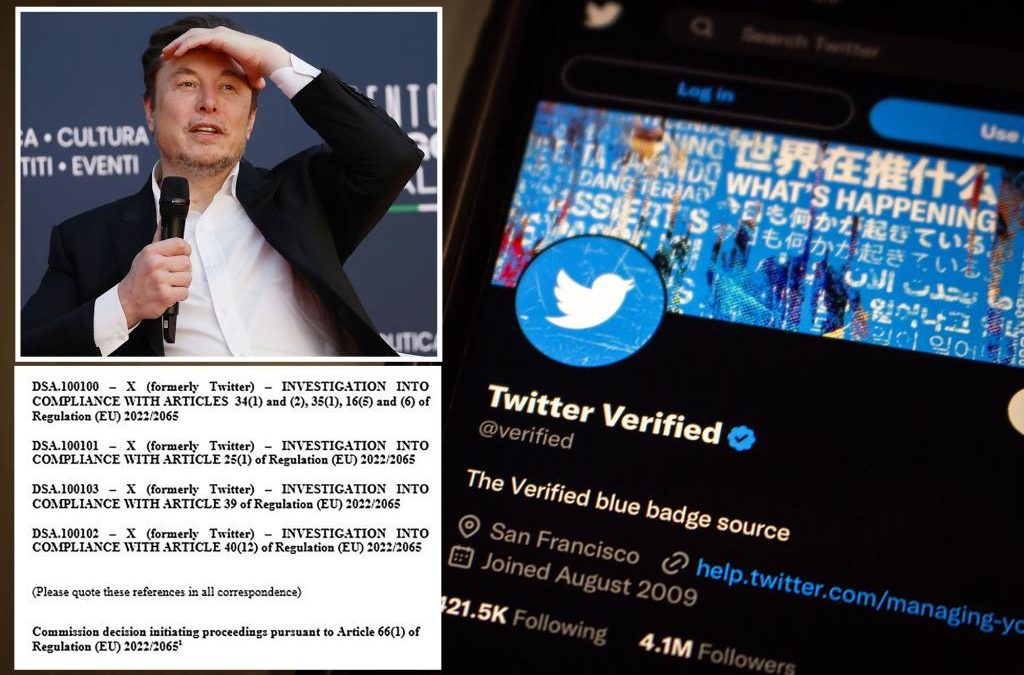The European Union has launched an investigation into whether Elon Musk’s X is complying with rules that require the social media giant to counter illegal content and disinformation.
The European Commission said its proceedings will “assess whether X may have breached the DSA” — the Digital Services Act, which went into force for platforms with more than 45 million EU-based users in August.
It’s the first probe of its kind under the new law, which comes after the site submitted a risk assessment report in September, released a transparency report a month later and replied to a request for information that “concerned the dissemination of illegal content in the context of Hamas’ terrorist attacks against Israel,” according to a press release.
The commission specifically noted Musk’s social media platform may not be taking effective measures “to combat information manipulation on the platform.”
Specifically, X’s “so-called ‘Community Notes’ system in the EU” will also be called into question, according to the EU’s statement.
Community Notes, previously known as Birdwatch, launched in 2021 under then-Twitter owner Jack Dorsey.
Musk has since bolstered the fact-checking program, especially as he faced mounting criticism for allowing users to spread unverified claims about the ongoing Israel-Hamas conflict.
EU Commissioner Thierry Breton also announced the probe of X on his own X account on Monday, sharing that the commission suspects that the platform also has a “deceptive design of user interface” and pointing to its controversial verification system.
Known as Twitter Blue, the subscription involves handing out blue checks to anyone willing to fork over $7.99 a month.
Previously, the sought-after icon was only granted to celebrities, politicians, journalists and the like as a way to distinguish between the authentic person and an impostor.
X, however, insists in its Help Center that only individuals with “no signs of being misleading or deceptive,” as well as “no signs of engaging in platform manipulation and spam” are qualified to receive a blue check.
The practice “may have breached the DSA,” the EU said in a press release regarding its latest online safety regulation.
As of February 2024, the DSA will apply to all types of content-sharing sites, app stores and search engines, calling on them to do more to prevent the sharing of harmful or inaccurate information.
After the initial probe, the commission said it “will continue to gather evidence, for example by sending additional requests for information, conducting interviews or inspections.”
It also notes that the Digital Services Act does not set a legal deadline for bringing formal proceedings to an end.
X’s head of business operations Joe Benarroch told The Post that “X remains committed to complying with the Digital Services Act, and is cooperating with the regulatory process.”
“It is important that this process remains free of political influence and follows the law. X is focused on creating a safe and inclusive environment for all users on our platform, while protecting freedom of expression, and we will continue to work tirelessly towards this goal,” Benarroch added.
X has already been accused by the cyber division of Israel’s state prosecutor’s office of being less cooperative than rivals Meta and TikTok when it comes to removing posts that the Israeli government deems “incitement to terrorism,” according to a report.
Of the more than 39,000 pieces of content that were flagged by Israeli officials, around 26,000 have been deemed worthy of being removed, according to a report in the Hebrew-language daily TheMarker.
The state prosecutor’s office, which falls under the auspices of the Justice Ministry, said more than 92% of the content that was flagged as problematic to platforms including Facebook, Instagram — both owned by Meta — and Alphabet’s YouTube were removed.
X and Telegram, however, are two apps that have not been as cooperative in removing anti-Israel content, according to the report.
It wasn’t immediately clear how many posts the sites declined to remove.
Source




